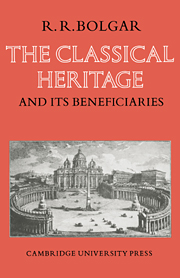Book contents
- Frontmatter
- Contents
- Preface to 1973 impression
- Introduction
- Chapter I The Background
- Chapter II The Greek East
- Chapter III The Carolingian Age
- Chapter IV The Pre-scholastic Age
- Chapter V The Scholastic Age
- Chapter VI Collapse and New Beginnings
- Chapter VII The High Renaissance
- Chapter VIII The End of the Renaissance and the Appearance of New Patterns in Classical Education and Scholarship
- Chapter IX Education and the Classical Heritage
- Notes
- Appendix I Greek MSS. in Italy during the Fifteenth Century
- Appendix II The Translations of Greek and Roman Classics before 1600
- Index
Chapter III - The Carolingian Age
Published online by Cambridge University Press: 29 January 2010
- Frontmatter
- Contents
- Preface to 1973 impression
- Introduction
- Chapter I The Background
- Chapter II The Greek East
- Chapter III The Carolingian Age
- Chapter IV The Pre-scholastic Age
- Chapter V The Scholastic Age
- Chapter VI Collapse and New Beginnings
- Chapter VII The High Renaissance
- Chapter VIII The End of the Renaissance and the Appearance of New Patterns in Classical Education and Scholarship
- Chapter IX Education and the Classical Heritage
- Notes
- Appendix I Greek MSS. in Italy during the Fifteenth Century
- Appendix II The Translations of Greek and Roman Classics before 1600
- Index
Summary
Having arrived at the very threshold of the Renaissance, we must now return to the beginning of the Dark Ages and consider the development of the West during those same seven hundred years whose course we have just surveyed in the East. For conditions in the two halves of Europe were vastly different. In Byzantium we saw the shrinking nucleus of a superior civilisation, fearful of loss, constantly on the defensive, stereotyped in its institutions and culture. In the West we shall see by contrast evidences not of atrophy but of growth. The Western peoples were more anxious to acquire new blessings than to preserve the few they could already command. Their world had touched rock bottom, had been plunged into chaos and was now in mid-passage out. Unafraid of change, they were not desirous of barring its effects from any sector of their lives. The period of the Roman past glittered in their traditions as a golden age which having existed once could no doubt be restored; and that conviction in the midst of their ever-present discontents made them eager to throw as much as possible into the melting-pot.
Our proper starting-point is in time the sixth century and in space a remote island to which Roman power had never extended its latinising sway. The Ireland of St Patrick was the first place to which the literary heritage of the classics came, as it was to come eventually to the whole of Western Europe, from the outside, a gift of the gods to be won through judicious learning, a gift possibly of forbidden fruit.
- Type
- Chapter
- Information
- The Classical Heritage and its Beneficiaries , pp. 91 - 129Publisher: Cambridge University PressPrint publication year: 1973

